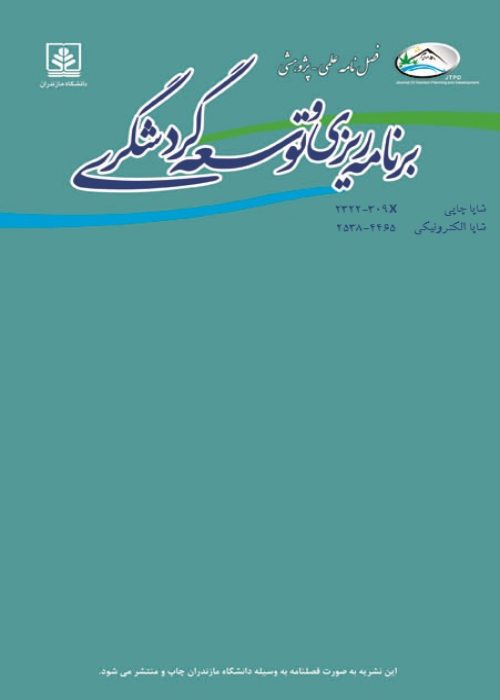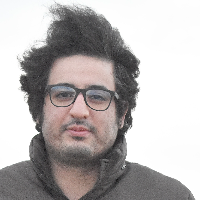A Phenomenological Study of the Relationship between Ecotourism and Environmental DestructionBased on Heidegger Philosophical Thoughts
Author(s):
Article Type:
Research/Original Article (دارای رتبه معتبر)
Abstract:
The aim of this paper is to offer a philosophical analysis of ecotourism destruction. By an emphasis on Heidegger’s thought, the approach of this study is phenomenological. The study’s style is phenomenological description. In a general sense according to the findings, the destructive effects of ecotourism depend on the attitude of tourists. And the view of tourist regarding nature is associated with his mode of being, respectively. Nowadays, for the predominance of mercantilist view over ecotourism industry, the proper outlook has been ruined and as it’s result, the deep relationship between man and nature has been encountered with crisis. The phenomenological analysis of Heidegger provides a possibility for understanding such an incident, but nevertheless, Heidegger unleashes a solution in order to resolve this crisis. In Heidegger’s view, developing an art-oriented attitude regarding nature could be a suitable alternative for such an exploitative attitude.
Discussion and
Introduction
The crisis of environment in these days, is an issue which has catch the attentions of scientists, experts. In the last decades, from different points of view, this issue has been dealt with. It is some days that philosophers have become interested in offering philosophical accounts of this environmental crisis. But developing such philosophical studies have rarely conducted to fields like ecotourism and its destructive effect on nature or environment. Philosopher is concerned with the relation between man and nature. In our era, it seems that this relation has been devastatingly ruined. One of those philosophers who can assist us to perceive this event is Martin Heidegger. Consequently, this article has written based on Heidegger’s thought and its aim is to offer an analysis of tourist’s relation with nature and environment. In order to approach this goal, three questions are prepared to be responded: 1 – what is the dominant attitude which has led to the environmental destruction 2- on this ground, how is this possible to elaborate the destructive effects of ecotourism? 3- How Heidegger’s art-orientated approach is able to offer a solution to avoid such destructive results of ecotourism on environment?
Materials and Method
As mentioned, this study tries to offer a philosophical account of destructive effects of ecotourism on environment. The statistical society is the first and second hand sources which were available to researchers and in proportion of the paper’s aim a phenomenological method applied. In philosophical studies, descriptive methods are beneficial to explain theories and their concepts. Heideggerian way of phenomenology is an endeavoring in order to uncover being- world, man and nature. Nevertheless, for Heidegger phenomenology is not the sole study of consciousness of objects or events, but it is an outlook toward objective existence by which phenomenon is permitted to be revealed. On this ground, the aim of the study is to show the Heidegger’s philosophical encounter with nature and other related issues. Discussion and
result
In the latest decade, environmental crisis and a concern to resolve it has transformed into a global problem. It is tried in this article, to take a look at this issue from a Philosophical perspective. Among different philosophers, Martin Heidegger is one who made possible such an analysis. He assumed the root of this hostility toward nature lies in the priority of instrumental thought of modern man. He believed the roots of this event must be traced through humanism. The modern man took himself as the center of cosmos and then was allowed to overcome it. The insatiable desire which provoked in modern man to dominate on nature, led to a new interpretation of the world, man and his relations with world. This problem to the extent which is related to nature has reduced it to source of energy which is possible to be saved and is consumed to the future needs. On this ground, one can also analyze the effects of ecotourism on nature and environment. Tourist encountering as an authentic creature with nature is not the same with a tourist as a person who live in everyday life. As Heidegger has remarked, this man is unable to perceive nature as a presence. However, relinquishing such an instrumental view regarding nature is not impossible. It can be done by replacing an art-oriented attitude. According to Heidegger, art is the realm of rising of existence and unfolding of truth, a realm which makes it possible to perceive the nature as it is.
Conclusion
Environmental destruction is one consequences of tourists’ altering of attitude in respect of environment. Instrumental view regarding environment which finds its strength from an utilitarianistic attitude causes tourists’ alienation towards his own environment. It seems that contemporary man is no longer able to open a dialogue with nature. He is separated and disappointingly far from the nature, in the sense that this statement might be extended to tourists’ mode of encountering with environment. Preserving and taking care of environment requires a new outlook. Heidegger’s analysis of human condition and his relation to nature reveals the roots of this crisis as well as it discloses the way of its resolving. According to Heidegger, art is a field in which the essence of nature unfolds itself as it is. Hence, the path of escape is but resorting to an art-oriented outlook. Nevertheless, paying a heed to educational institutions in order to disseminate and provide an art-oriented attitude seems necessary. The role of these institutions lies in their deepening a proper attitude regarding environment. Promulgating an art-oriented attitude calls for a special attention to education. Eternal association between school and environment and outlining such a preoccupation in schools in one hand and in other hand avoiding from any emphasizing on utilitarianistic view of nature, as a whole help us to construct a distinctive attitude.Keywords:
Ecotourism , Environment , Destruction , Heidegger , Art
Language:
Persian
Published:
Journal of Tourism Planning and Development, Volume:8 Issue: 28, 2019
Pages:
8 to 32
magiran.com/p2021195
دانلود و مطالعه متن این مقاله با یکی از روشهای زیر امکان پذیر است:
اشتراک شخصی
با عضویت و پرداخت آنلاین حق اشتراک یکساله به مبلغ 1,390,000ريال میتوانید 70 عنوان مطلب دانلود کنید!
اشتراک سازمانی
به کتابخانه دانشگاه یا محل کار خود پیشنهاد کنید تا اشتراک سازمانی این پایگاه را برای دسترسی نامحدود همه کاربران به متن مطالب تهیه نمایند!
توجه!
- حق عضویت دریافتی صرف حمایت از نشریات عضو و نگهداری، تکمیل و توسعه مگیران میشود.
- پرداخت حق اشتراک و دانلود مقالات اجازه بازنشر آن در سایر رسانههای چاپی و دیجیتال را به کاربر نمیدهد.
دسترسی سراسری کاربران دانشگاه پیام نور!
اعضای هیئت علمی و دانشجویان دانشگاه پیام نور در سراسر کشور، در صورت ثبت نام با ایمیل دانشگاهی، تا پایان فروردین ماه 1403 به مقالات سایت دسترسی خواهند داشت!
In order to view content subscription is required
Personal subscription
Subscribe magiran.com for 70 € euros via PayPal and download 70 articles during a year.
Organization subscription
Please contact us to subscribe your university or library for unlimited access!




